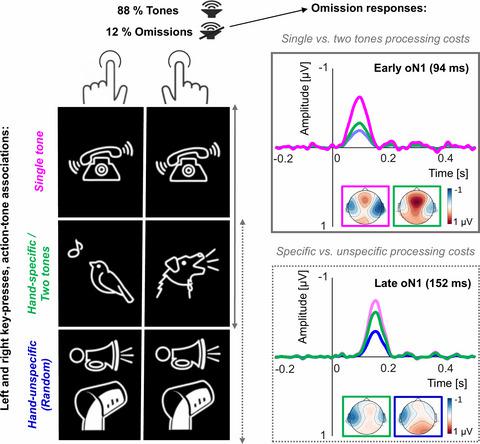当前位置:
X-MOL 学术
›
Eur. J. Neurosci.
›
论文详情
Our official English website, www.x-mol.net, welcomes your
feedback! (Note: you will need to create a separate account there.)
What exactly is missing here? The sensory processing of unpredictable omissions is modulated by the specificity of expected action-effects.
European Journal of Neuroscience ( IF 2.7 ) Pub Date : 2020-07-09 , DOI: 10.1111/ejn.14899 Betina Korka 1 , Erich Schröger 1 , Andreas Widmann 1, 2
European Journal of Neuroscience ( IF 2.7 ) Pub Date : 2020-07-09 , DOI: 10.1111/ejn.14899 Betina Korka 1 , Erich Schröger 1 , Andreas Widmann 1, 2
Affiliation

|
We select our actions according to the desired outcomes; for instance, piano players press certain keys to generate specific musical notes. It is well‐described that the omission of a predicted action‐effect may elicit prediction error signals in the brain, but what happens in the case of simultaneous effector‐specific (by contrast to effector‐unspecific) predictions? To answer this question, we asked participants to press left and right keys to generate tones A and B; based on the action‐effect association, the tones’ identity was either predictable or unpredictable, while rarely, the expected input was omitted. Crucially, the data show that omissions following hand‐specific associations reliably elicited a late omission N1 (oN1) component, by contrast to the hand‐unspecific associations, where the late oN1 was rather weak. An additional condition where both key‐presses generated a unique tone was implemented. Here, rare omissions of the expected tone generated both early and late oN1 responses, by contrast to the condition in which two simultaneous action‐effect representations had to be maintained, where only late oN1 responses were elicited. Finally, omission P3 (oP3) responses were strongly elicited for all omission types without differences, indicating that a general expectation based on a tone presentation (rather than which tone), is likely indexed at this stage. The present results emphasize the top‐down effects of action intention on the sensory processing of omissions, where unspecific (vs. specific) and multiple (vs. single) action‐effect representations are associated with processing costs at the early sensory levels.
中文翻译:

这里到底缺少什么?不可预知的遗漏的感官处理受到预期作用效果的特异性的调节。
我们根据期望的结果选择行动;例如,钢琴演奏者按下某些键可生成特定的音符。众所周知,省略预期的动作效应可能会在大脑中引发预测误差信号,但是如果同时进行特定于效应器的预测(与非效应器相反),会发生什么呢?为了回答这个问题,我们要求参与者按左右键来生成音调A和B;基于动作效果关联,音调的身份是可预测的或不可预测的,而很少会省略预期的输入。至关重要的是,数据表明,与特定手关联相关的遗漏可靠地引发了后期遗漏N1(oN1)成分,与之相对,对于特定手相关的遗忘,后期oN1相对较弱。还实现了两个按键都产生唯一音调的附加条件。在这种情况下,与预期的音调相比,罕见的遗漏会产生早期和晚期的oN1响应,这与必须同时保持两个同时的动作效果表示的情况相反,在这种情况下,仅会引起晚期的oN1响应。最后,对于所有类型的遗漏都强烈引发了遗漏P3(oP3)响应,没有差异,表明在此阶段可能会索引基于音调表示(而不是哪种音调)的总体期望。本研究结果强调了行动意向对遗漏的感官处理的自上而下的影响,其中不明确的(相对于特定的)和多重的(相对于单一的)作用效果表示与早期感官水平的处理成本相关。
更新日期:2020-07-09
中文翻译:

这里到底缺少什么?不可预知的遗漏的感官处理受到预期作用效果的特异性的调节。
我们根据期望的结果选择行动;例如,钢琴演奏者按下某些键可生成特定的音符。众所周知,省略预期的动作效应可能会在大脑中引发预测误差信号,但是如果同时进行特定于效应器的预测(与非效应器相反),会发生什么呢?为了回答这个问题,我们要求参与者按左右键来生成音调A和B;基于动作效果关联,音调的身份是可预测的或不可预测的,而很少会省略预期的输入。至关重要的是,数据表明,与特定手关联相关的遗漏可靠地引发了后期遗漏N1(oN1)成分,与之相对,对于特定手相关的遗忘,后期oN1相对较弱。还实现了两个按键都产生唯一音调的附加条件。在这种情况下,与预期的音调相比,罕见的遗漏会产生早期和晚期的oN1响应,这与必须同时保持两个同时的动作效果表示的情况相反,在这种情况下,仅会引起晚期的oN1响应。最后,对于所有类型的遗漏都强烈引发了遗漏P3(oP3)响应,没有差异,表明在此阶段可能会索引基于音调表示(而不是哪种音调)的总体期望。本研究结果强调了行动意向对遗漏的感官处理的自上而下的影响,其中不明确的(相对于特定的)和多重的(相对于单一的)作用效果表示与早期感官水平的处理成本相关。











































 京公网安备 11010802027423号
京公网安备 11010802027423号